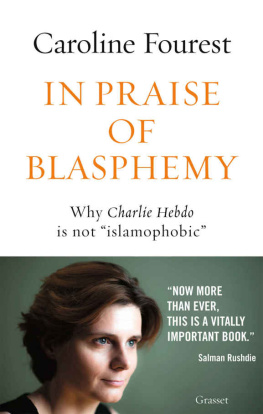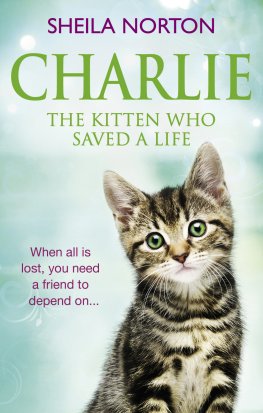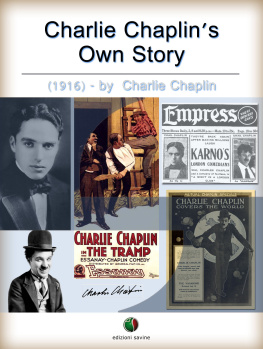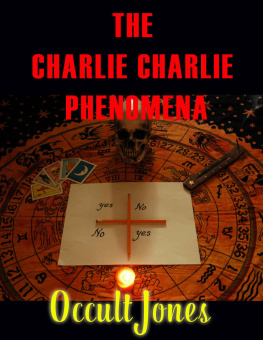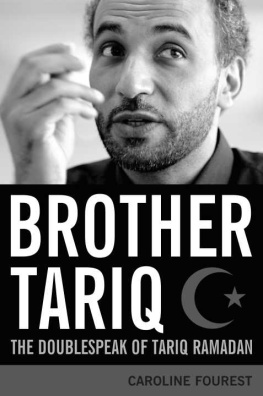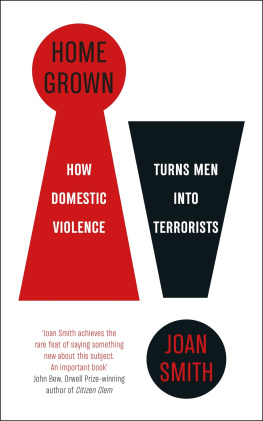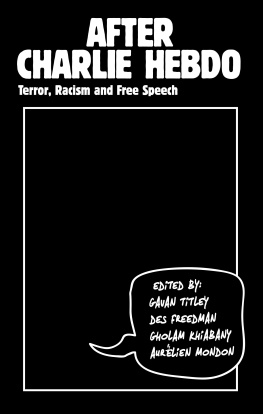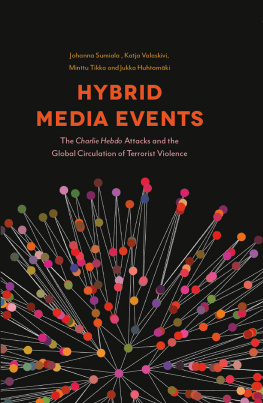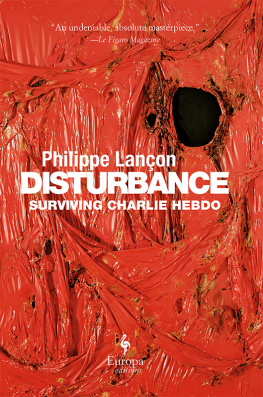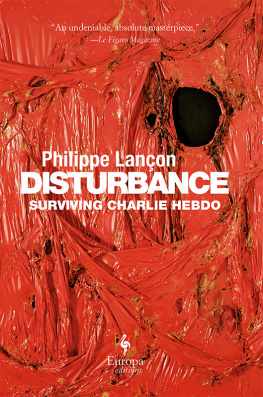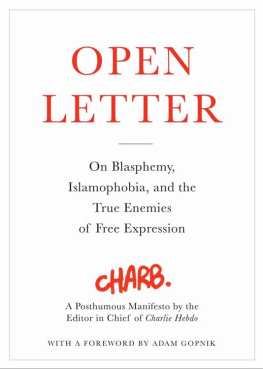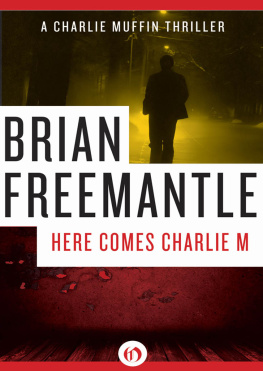To all the victims of fanaticism and terrorism, wherever it strikes.
To the survivors of Charlie .
Introduction
What had we been talking about the morning of the attack? I cant remember. I could just hear someone sobbing on the phone: Charb is dead. How could I check? It seemed ridiculous.
But Charb doesnt answer his phone. Just one thought started spinning round and round in my head: The bastards. Theyve actually done it. Wed been talking about the threats for nine years, ever since the controversy over the cartoons which wed been through together. To ward off the fear, we would sometimes laugh about it, but not out of naivety. The risk existed. Charb knew that. He was under police protection. I want to believe that its just a scratch, that he laughed in their faces, that hell be all right.
On the news theyre talking about a shooting and ten people wounded, perhaps seriously. I need to know, I need to see them.
The police have already erected barriers. Passersby are asking questions.. Richard Malka, Charlies lawyer, has just arrived. Jeannette Bougrab as well. We run up together. The police let us through. Reporters have already arrived. And public officials: the President, the Mayor of Paris, her deputies. They already know. The looks on the faces of the paramedics shatter our hopes. Charb really is dead. His body lies a few stories up, he is not the only one. Dont go up. The chief paramedic speaks of a real war zone.
The theatre opposite the newspaper has been requisitioned for the survivors, shadowy figures huddled together in the velvet seats. Luz has survived. It was his birthday. He had overslept. A candle, a moment of tenderness, and running late had saved him. He realises what this means. From this moment his world has changed forever. He is pinned down by the weight of the universe. His old familiar world of paper no longer exists.
Catherine was also running late that morning. Death just missed her. A few seats away Sigolne relives that moment of madness when her own bright eyes gazed into the killers eyes, beautiful eyes. Ive spared your life, you must read the Koran. What a terrible play.
Patrick Pelloux has returned from the hospital. He knows who has survived and who has died. When he entered the editorial office he had seen their bloodied bodies. Their hearts had stopped beating. Well never hear them laugh again.
Every name he reads out, his voice trembling, is a dagger to the heart. Cabu... Theyve killed Cabu. The king of cartoons, the gentlest man in the world, with a kalachnikov. Such madness.
And Tignous. Not Titi. With his tousled hair, his Parisian street urchin accent, his kind smile.
Anyone who has ever seen him smile, just once, could not possibly want to kill him.
And Wolin, who adored women and adored drawing them. Who could possibly hold a grudge against him? And Honor? Who could bear a grudge against this gentle, shy giant, who loved walking and talking about Paris?
Above the cries from the back of the theatre and the weeping of the families who are arriving, I hear the name Bernard Maris. I buckle at the knees. His gentle but unwavering revolt against capitalism never stopped him believing in a better world, nor making the most of the best in this life. Someone so alive, curious, and intelligent erased from our lives, it doesnt make sense.
And Elsa, always there to offer solace? And Mustapha the erudite proofreader, who, far from his beloved Kabylie, found comfort in the French language which he rendered so noble?
And Franck, Charbs bodyguard, who only had a handgun to defend them against a weapon of war? And Ahmed the policeman, cowardly assassinated a few streets away.
A hideous nightmare. Inside the theatre the intensity of our grief provides warmth. But we must soon leave; we must confront the harsh glare of the world. History is waiting to give words and meaning to this horror.
Outside millions of people are waiting to embrace my friends and colleagues. That same evening people meet up spontaneously at the Place de la Rpublique. Their candles provide warmth. On 11 January the streets are flooded with the most beautiful response to this massacre. Four million people. A gentle tide. In nationwide communion, worthy of the liberation of Paris. Anyone who was not on the streets that day cannot know what this country is capable of.
They waited for hours in the cold to begin marching, warmed by the sense of fraternity. At Place de la Nation they climbed onto the statue, like in a painting by Delacroix. This time it was not a bare-breasted woman who symbolized freedom, but a young man holding up a pencil. At the foot of the monuments ever more candles were lit, giving off a gentle light. People left books of poetry, sang songs of fraternity. Incidents were feared, but all we saw was solidarity.
People braved their fear of being attacked, hurt or killed to breathe the comforting air of being together. Despite the noxious messages of the quibblers and those fearing political recuperation. Waving banners Je suis Charlie and French flags, peacefully, kindly. No hate in this comforting, beautiful, determined, sad but joyful, rebellious and united tide. No inappropriate outbursts, no anger. It is not a demonstration against, but a march for. A moment of pure sharing.
Paris stretches out before us, deserted. The leaders of the procession walk silently down boulevard Voltaire. Families at their windows wave their flags Je suis Charlie and applaud. The sidewalks are so crowded they seem to push back the city walls. Smiling faces of all colours. A man cries out: I am a Muslim and I support you. Long live Charlie , We are with you, We are not afraid, We stand tall. Young children on their parents shoulders say thank you. Thank you Charlie.
Huddled together, my friends and colleagues lead the procession, like kamikazes wearing white headbands distributed by the stewards. Didnt hurt a bit, that would be a lie. But Not a bit scared means standing strong.
Earlier, some of the team went over to embrace the family of Franck, Charbs bodyguard. The family of Clarissa, the local police officer killed by Coulibaly, are devastated with grief, as are the families of those assassinated at the Hyper-Casher by the same terrorist.
For a brief moment Luz leaves the head of the procession to make some sketches, as if he were covering a story, as if he could at the stroke of a pen both immortalize and desacralize this moment. Behind us, all the personalities that Charlie has caricatured year in year out are marching. Forty Heads of State, including some who more often crush freedom of the press than uphold it. The Foreign Minister of Russia, whose justice department sent Pussy Riot to a prison camp for blaspheming against Putin inside a cathedral. The Prime Minister of Turkey, whose justice department is prosecuting a cartoonist for offending his Islamist president. The Emirates came in full force. Qatar sent the brother of the Emir. Saudi Arabia their Foreign Minister while continuing to flog the blogger Raif Badawi, sentenced to 1,000 lashes for ridiculing Islam, denounced as an apostate for having written Muslims, Christians, Jews and atheists are all equal.
In those parts of the world a satirical magazine like Charlie Hebdo would not last a single day. In those shackled countries people cant do anything, except protest against those who question all that is considered sacred. Whenever a journalist or an illustrator takes up a pen, he is intimidated, imprisoned or murdered, with the complicity of the State and sectors of society which are repressed or too scared to protest. Under those regimes incitement to hatred is the rule and not the exception.

